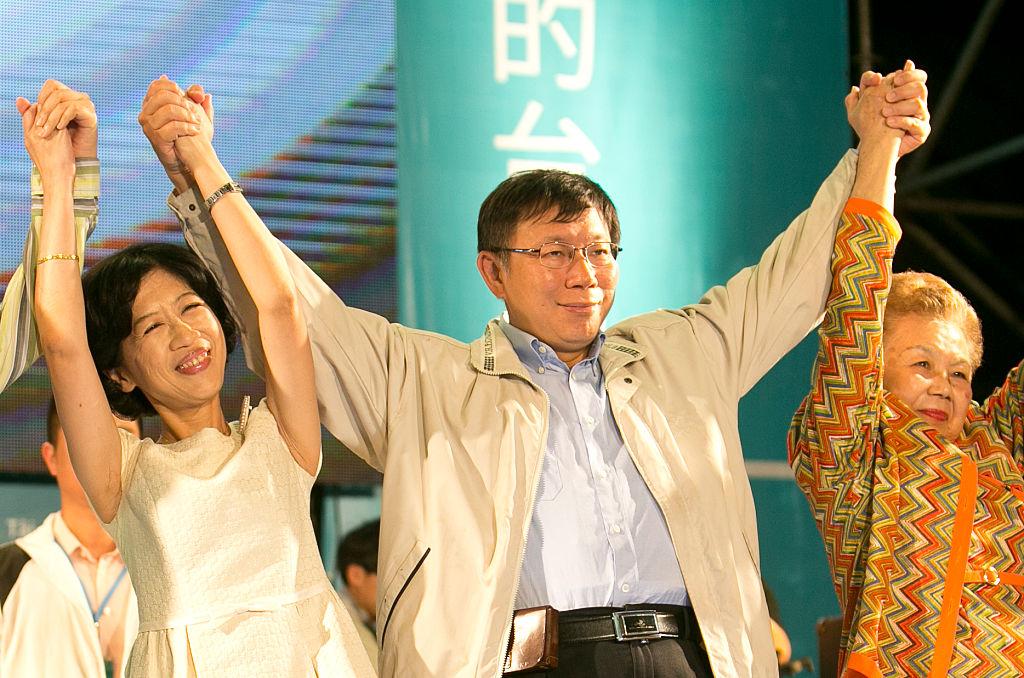
With elections due in early January 2020, Taiwan’s presidential race is heating up. Besides the candidates from the two major parties, the Kuomintang (KMT) and the Democratic Progressive Party (DPP), there’s an outsider who is so far getting little attention.
The mayor of Taipei, Ko Wen-je, is yet to announce his formal candidacy but could be laying the foundations to run. On 6 August, he established a new political party, called the Taiwan People’s Party, putting unity at the centre of his campaign. ‘We will use the power of the people to change Taiwan’, Ko said.
At a time when Taiwan’s democracy is being tested, Ko’s theme of unity is important. Despite the pride Taiwanese of all political persuasions have in their hard-won freedoms, there’s a widespread recognition that Beijing is now chipping away at the foundations of Taiwan’s young democracy.
Much like the Republicans in the US in 2016, Taiwan’s oldest political party has been hijacked by a populist. In early July, the KMT selected the pro-China mayor of Kaohsiung, Han Kuo-yu, as its candidate.
Known for singing KMT military songs at rallies, Han has been a consistent advocate of interests close to Beijing’s heart. Among Han’s headline-grabbing policies is acknowledgement of the so-called 1992 consensus, which posits that the mainland and Taiwan form one China, even if their respective governments may have different interpretations of how China ought to be governed. Beijing sees acknowledgement of the 1992 consensus as a prerequisite for dialogue with Taipei.
Han’s pro-Beijing stance wouldn’t be such an issue if there were a strong incumbent. Despite a recent uptick in the polls, President Tsai Ing-wen of the pro-autonomy DPP is still trying to regain some political momentum after a few setbacks over the past year.
Since taking office in 2016, Tsai has had to deal with Beijing’s wrath. In a nod to the pro-independence ‘deep-green’ faction of the DPP, Tsai hasn’t recognised the 1992 consensus—which she considers to be notion promulgated by the KMT in league with the CCP without the involvement of Taiwan’s national government. Beijing has punished Tsai for not recognising the consensus, cutting off dialogue with her government in Taipei.
Beyond disagreements on the 1992 consensus, Tsai’s policy on China has been moderate, which has angered the DPP’s pro-independence deep-green faction. During a session in September 2017, Tsai’s deep-green former premier William Lai referred to himself as a ‘Taiwan independence worker’ in the Legislative Yuan. The comments resurfaced in April last year, weakening Tsai’s authority as she tried pushing back against Beijing while keeping hold of Taiwan’s few diplomatic allies.
Tsai’s most pressing problems are domestic. For socially conservative Taiwanese, her progressive agenda in favour of same-sex marriage, pension reforms and reparations from the KMT’s authoritarian rule has been a bridge too far. Liberal Taiwanese say she hasn’t gone far enough. In trying to please everyone, Tsai has satisfied no one and the electorate’s frustration is palpable.
Beijing has inflamed the anger. In a report for the Financial Times, journalist Katrin Hille suggested that the Chinese Communist Party’s intelligence services infiltrated Taiwanese media outlets to support Han’s candidacy during November’s local elections. Han has since used his mayorship in Taiwan’s southern port city as a platform to launch a campaign for president, and the pro-Beijing media’s coverage of him remains largely supportive.
Han’s connections to the mainland trouble many, especially those who support Tsai’s DPP. In March, Han made a much-publicised visit to the Chinese government’s Hong Kong liaison office and also met with Hong Kong’s chief executive, Carrie Lam.
More worryingly, Han received a public endorsement from the founder of China Unification Promotion Party, Chang An-lo. Referred to in the media as the ‘White Wolf’, Chang has known connections to organised crime in both Taiwan and the mainland.
Though a stable relationship with China is desired by many in Taiwan, Han’s ties to Beijing are likely to make even the strongest supporters of the KMT suspicious. That, combined with his scuffles with former KMT rival and Foxconn founder Terry Gou, suggests that Han may be making too many of the wrong enemies.
Recent polls suggest that support for both Han Kuo-yu and Tsai Ing-wen is falling, though Ko hasn’t confirmed that he’ll enter the race. Many voters aren’t convinced that Tsai can keep her own party in order, and some conservative voters are growing tired of Han’s bluster.
Positioning himself in the political centre could turn out to be a viable strategy for Ko given the rising proportion of undecided voters. As mayor of Taipei, he has pleased neither Beijing unificationists nor Taiwan independence activists. ‘Reunification and independence are fake issues’, Ko observed earlier this year.
Playing both sides of the Taiwan Strait can make Ko seem disingenuous to some. He met with the head of Beijing’s Taiwan Affairs Office, Liu Jieyi, in July, raising questions about his own ties to Beijing.
Ko is expected to announce whether he’ll run or not by early September. If he decides to do so, he’ll need to win over moderate voters who are dissatisfied with Tsai but deeply sceptical of Han. Yet, such a strategy could siphon votes from Tsai and provide a path to victory for Han. That would mean walking Taiwan right into Beijing’s perfect storm.